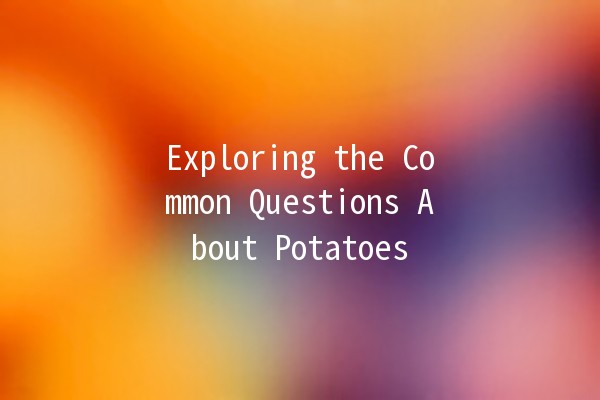When it comes to versatile and widely loved foods, potatoes have carved out a special space in our hearts and kitchens. Whether mashed, baked, boiled, or fried, potatoes provide not only comfort but also nutrition. As more people embrace the health benefits of this root vegetable, curiosity about potatoes also grows, leading to numerous questions. This article explores the most common inquiries regarding potatoes, providing practical tips and insights to boost your knowledge and experience with this delightful food.
Understanding Potatoes: A Brief Overview
Potatoes belong to the nightshade family and are cultivated in various regions around the world. They come in hundreds of varieties, each with unique textures, flavors, and culinary uses. Potatoes are rich in vitamins, minerals, and dietary fiber, making them an integral component of a balanced diet.
Potatoes can be categorized into several types based on texture and usage:
Waxy Potatoes: These have a smooth, moist texture, making them perfect for boiling and salads. Examples include red and new potatoes.
Starchy Potatoes: These are fluffy and dry, ideal for baking and mashing. Common examples are Russet and Idaho potatoes.
AllPurpose Potatoes: A versatile choice suitable for various cooking methods, these include Yukon Gold potatoes.
Practical Application:

When choosing potatoes for a dish, consider the type needed. For instance, use starchy potatoes for a creamy mashed potato dish and waxy potatoes for a fresh potato salad.
Storing potatoes properly can greatly affect their longevity andFlavor:
Keep Them Cool and Dark: Store potatoes in a cool, dark place, ideally between 45°F to 50°F (7°C to 10°C).
Avoid Refrigeration: Storing potatoes in the fridge can convert starch to sugar, affecting their taste and texture.
Store in Paper Bags: Instead of plastic, using paper bags or baskets allows for air circulation, preventing moisture buildup.
Practical Application:
Check your potato storage environment. If your potatoes sprout or become soft, they should be discarded to avoid culinary mishaps.
Before cooking potatoes, proper preparation is essential:
Washing: Rinse potatoes thoroughly under cold water to remove dirt and pesticides.
Peeling: Depending on the recipe, you may choose to peel potatoes. However, leaving the skin on can retain nutrients and add texture.
Cutting: For even cooking, cut potatoes into uniform sizes, whether you are frying, baking, or boiling.
Practical Application:
When making roasted potatoes, cut them into similarsized pieces to ensure they cook evenly and achieve a crispy exterior.
Potatoes are often misunderstood, but they are packed with nutritional value:
Rich in Nutrients: Potatoes provide Vitamin C, B vitamins, potassium, and fiber.
GlutenFree: A great option for those with gluten sensitivity, potatoes can be a staple in glutenfree diets.
Sustained Energy: The carbohydrate content in potatoes offers a quick energy boost.
Practical Application:
Incorporate potatoes into your meals. For breakfast, consider a potato and vegetable hash or bake a potato topped with healthy ingredients for lunch.
Various cooking methods can enhance the flavor and texture of potatoes:
Boiling: Great for mashed potatoes or salads. Boil until forktender.
Baking: Poke holes in the skin and bake at 400°F (200°C) for about 45 minutes.
Frying: Cook cut potatoes in hot oil until golden brown—perfect for fries and chips.
Microwaving: A quick method; stab potatoes with a fork and microwave on high until soft.
Practical Application:
Experiment with different cooking methods. For instance, try roasting potatoes with herbs and olive oil for a flavorful side dish that enhances meal enjoyment.
Several myths surrounding potatoes can lead to misconceptions:
Myth: Potatoes are fattening.
Reality: Potatoes are low in calories and fatfree. The way you prepare them (frying vs. baking) makes a significant difference.
Myth: Eating potatoes will spike blood sugar levels.
Reality: When consumed in moderation, whole potatoes can be part of a balanced diet and do not cause significant blood sugar spikes.
Practical Application:
Understand the nutritional value of potatoes to make informed dietary choices. Pair them with proteins and healthy fats for balanced meals.
Potatoes are not just a staple on our plates but a source of numerous questions and learnings. From their health benefits to proper storage techniques, understanding potatoes enhances our appreciation for this humble yet versatile vegetable. By embracing the tips and insights shared above, you can enjoy potatoes in a myriad of delicious and nutritious ways.
FAQs About Potatoes
Potatoes can turn green due to exposure to light. The green color indicates the presence of solanine, a toxic compound that can cause nausea. It's essential to store potatoes in a dark place and cut away any green parts before cooking. If a potato is extensively green, it's best to discard it.
While small sprouts can be removed and the potato consumed, if the sprouting is extensive, it’s safer to discard the potato. The sprouts indicate increased solanine levels, making the potato potentially toxic.
Using a vegetable peeler, start from one end and peel in a downward motion, turning the potato as you go. For faster peeling, consider boiling them first to soften the skin, or try using a knife to carefully remove the skin in strips.
Potatoes are spoiled if they have a soft texture, extensive sprouting, or an off smell. Discolorations or significant green areas also indicate spoilage. It's essential to check your potatoes regularly to ensure culinary safety.
Yes, but raw potatoes do not freeze well due to their high water content. Instead, consider blanching them first or cooking them, then freezing them for later use in dishes. Frozen cooked potatoes can last around 1012 months.
For creamy mashed potatoes, use starchy potatoes, and add warm milk or cream gradually while mashing. Incorporating butter, sour cream, or cream cheese will enhance the creaminess and flavor.
By addressing these questions, you enhance your potato cooking skills and can enjoy them more fully with family and friends. Whether you are a seasoned chef or a kitchen novice, the versatility of potatoes offers endless culinary opportunities!